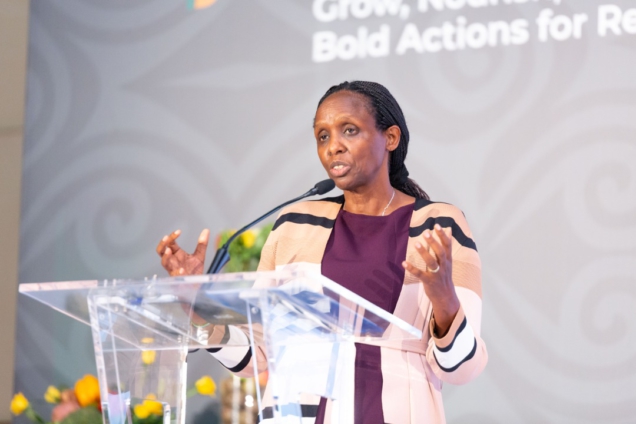The unprecedented and lengthy droughts in East Africa, the torrential rains in West Africa, the intensity of floods in Southern Africa and the progression of food insecurity on the continent remind us that climate change is an immediate reality in Africa. The risks are not for tomorrow but for now.
A few months ago, the IPCC warned that the Paris Agreement target of limiting the rise in temperatures to 1.5 degrees Celsius would probably be exceeded in the coming years, as reductions in greenhouse gas emissions are unfortunately not as fast and sustained as needed.
However, each additional fraction of a degree will bring more damage and suffering to our Continent. Everything must be done to minimize the scale and duration of an overshoot of climate objectives and to reduce its consequences. We have to get ready.
Reducing emissions, especially by the most industrialised and biggest polluter countries remains the priority – and for those countries that are historically the highest emitters, a moral obligation. As the earth reaches eight billion inhabitants, we have no other choice, in a tense economic, political and social context, but to work together in order to find common solutions to the climate crisis that threatens the planet and the living.
In Africa, where we only emit 4% of greenhouse gases and where we face devastating consequences, from droughts to food insecurity, this should happen first and foremost through adaptation, and in particular the adaptation of our agricultural systems.
Strengthening the resilience of food systems through better access to drought-tolerant seeds, extension, good quality fertilisers and conservation of water and soil carbon is increasingly becoming critical. But so is the need to be very intentional to preserve the failing SME ecosystem that is the basic source of services to farmers.
AGRA is prioritising many of these efforts to secure food and livelihoods. But these efforts to secure food must be matched by efforts to safeguard our farming landscape from degradation.
But no amount of adaptation or resilience building will replace the need to cut back on emissions. The food systems in industrialised countries are contributing 30% to emissions. Globally, farmers and lay people are most impacted by climate change, need these industrialised farmers to be considerate and to remember that what they are doing in their parts of the world is impacting farmers in Malawi, Kenya, Burkina Faso and across Africa.
Through the work of the Climate Overshoot Commission of which I am a member, we are looking into the pathways that can lead humanity to resolve the critical phase of the climate crisis. In addition to the need to reduce emissions–a central and unquestionable step–and the need to do much more on adaptation, we are analysing additional approaches such as removing carbon dioxide from the atmosphere and possibly cooling the planet by reflecting incoming solar radiation, their technological and governance challenges, opportunities and risks.
The Great Green Wall is an example of a solution that can combine adaptation, carbon capture and numerous economic and social benefits - employment, training, and social development for the populations concerned. Food security is another cornerstone of our economic development. We will need to find the funding, deepen the governance mechanisms and redouble our efforts to get there. We will also have to analyse with caution the existing technological approaches, including the most innovative and daring ones, to be able to understand their impacts on our populations, their risks and their possible contributions, and in order to determine those which will help in reaching prosperity and which will reduce the effects of the global climate crisis.
In the current difficult multilateral framework, marked by an unprecedented combination of crises, the climate crisis must remain at the top of the political agenda. Scientific research should be valued and supported, and the public debate reinvigorated.
No miracle solution exists. Some of the approaches that we are analysing could be used to minimize the impact for the populations most exposed, but we will not avoid reducing emissions and a great effort on adaptation, in order to continue to develop African economies in a warming world.
Finally, we will share, in the coming months, a list of practical and clear recommendations to draw paths that will help governance, scientific research and financing to respond to the risk of overshooting our climate objectives, with the conviction that Africa is a central player in global solutions.
*****
Dr Kalibata is the President of AGRA and a member of the Climate Overshoot Commission
Latest Stories
-
Former DR Congo president on trial for treason
12 minutes -
What about Patrick Boamah?
32 minutes -
I’ll collaborate with Minister and Parliament to expedite passage of Dual Citizenship Amendment Bill – Gyakye Quayson
38 minutes -
Bosomtwe Girls’ SHS Reflects on NSMQ Exit: “We’re more practical, not Just theoretical”
45 minutes -
‘I will never support LGBTQ+’ – Gyakye Quayson
51 minutes -
In pictures: Ivory Coast edge Nigeria late to secure WAFU-B U20 Boys Cup title
52 minutes -
Gyakye Quayson advocates refundable visa fees to protect Ghanaian travellers
55 minutes -
On the first lane: Adom Yeboah’s Olympic dreams
1 hour -
Gov’t set to launch ‘Responsible Mining Programme’ to empower local miners – Lands Minister
1 hour -
River Guards’ vigilance paying off in galamsey fight – Lands Minister
1 hour -
Rugby Africa President calls for urgent investment ahead of cup final in Uganda
1 hour -
Finance Minister justifies decision to delay Covid-19 levy removal
1 hour -
Between me, God, and a PR disaster: The story of a King’s assault, ego and meltdown
1 hour -
Gyakye Quayson assures cordial collaboration with Ablakwa despite age gap
2 hours -
Enterprise Insurance launches ClaimXpress – A new digital claims portal to redefine customer experience
2 hours

